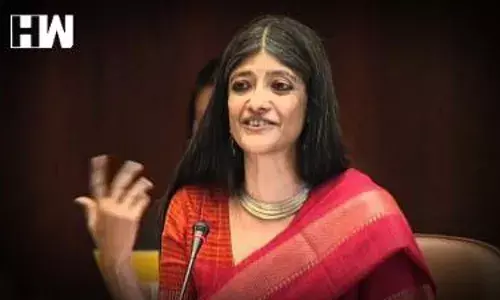UN Secretary-General Antonio Guterres has chosen Indian development economist Jayati Ghosh to a new high-level advisory group on effective multilateralism.
Professor Ghosh, 66, works at the University of Massachusetts Amherst. She was previously a professor of economics and the chairperson of the Centre for Economic Studies and Planning at Jawaharlal Nehru University’s School of Social Sciences. She is also a member of the UN’s Economic and Social Affairs High-Level Advisory Board.
Former Liberian President and Nobel Laureate Ellen Johnson Sirleaf and former Swedish Prime Minister Stefan Lofven will co-chair the Advisory Board on Effective Multilateralism, which Guterres announced on 27 March.
Ghosh has been appointed to the 12-member board, which will be assisted in its work by the United Nations University’s Centre for Policy Research, which will work closely with the Secretary-Executive General’s Office.
Ghosh was appointed to a high-level advisory board by Guterres in January last year, along with 19 other thinkers and personalities from around the world, to provide recommendations to the UN Secretary-General on how to respond to current and future socio-economic challenges in the post-COVID-19 world.
The UN Secretary-report General’s on Our Common Agenda, due out in September 2021, according to a press release issued this week, urges for improved governance of important global challenges. According to the UN, the ‘Our Common Agenda’ is an action plan aimed at strengthening and accelerating multilateral accords, particularly the 2030 Agenda, and making a concrete difference in people’s lives.
It includes ideas for renewed solidarity between peoples and future generations, a new social contract based on human rights, improved management of crucial global commons, and global public goods that deliver equitably and sustainably for everyone.
The report proposes a Future Summit in 2023 to advance ideas for governance arrangements in areas that could be considered global public goods or global commons, such as climate and sustainable development beyond 2030, international financial architecture, peace, outer space, digital space, major risks, and future generations’ interests.
The new advisory board will be asked to build on the ideas in Our Common Agenda, such as the importance of women and girls, as well as the need to consider the interests of young people and future generations, in order to make concrete recommendations for more effective multilateral arrangements on a variety of key global issues.
Their non-binding proposals would guide member states’ discussions at the projected Future Summit.
Xu Bu, president of the China Institute of International Studies; Poonam Ghimire, a Nepalese climate activist and United Nations Foundation Next Generation Fellow (2021) and Youth Power Climate Representative for COP26; Donald Kaberuka, Rwanda’s former finance and economic planning minister; and Nanjala Nyabola, a Kenya-based writer and researcher.
The board also includes Tharman Shanmugaratnam, Singapore’s Senior Minister, and Anne-Marie Slaughter, CEO of the New America Foundation, Professor Emerita of Politics and International Affairs at Princeton University, and former Director of Policy and Planning at the US Department of State.
As an independent media platform, we do not take advertisements from governments and corporate houses. It is you, our readers, who have supported us on our journey to do honest and unbiased journalism. Please contribute, so that we can continue to do the same in future.

